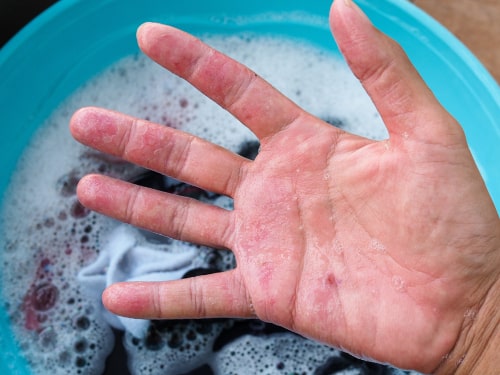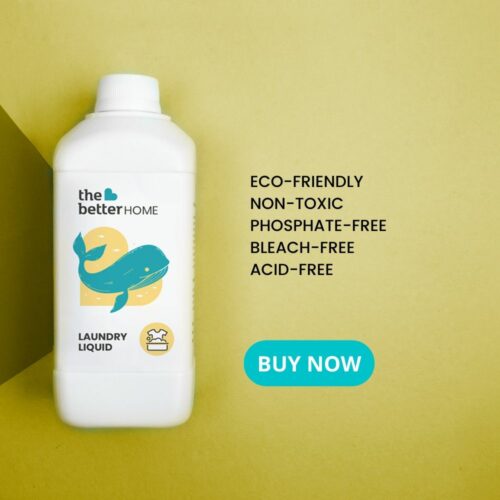Battling Eczema? Here’s How to Make Your Laundry Routine More Skin-Safe
How you care for your clothes affects more than just your style. It can determine the health of your skin and save you from painful allergies.

A clean, just-washed load of laundry is a relief. But, many people suffer from skin conditions such as eczema as a result of the detergent they use, making laundry day a much-disliked chore. Detergents are a common irritant to sensitive, allergy-prone skin. Atopic dermatitis (eczema) is a condition in which patches of skin become itchy, inflamed, rough and cracked.
Laundry detergents containing bleach, dyes, solvents and fragrances can aggravate existing symptoms, causing burning and redness in those with eczema and other skin conditions such as psoriasis. After all, our skin is the largest sense organ, and the chemical residue left behind on our clothes and bed linen is absorbed by thousands of pores on our skin. People with eczema often have an impaired skin barrier, making them more susceptible to these chemicals.
Laundry detergents are a product we use almost daily, making them difficult to avoid completely. If you suffer from eczema or other skin conditions it is important to find a detergent that suits your skin without aggravating your symptoms. If you are trying a new detergent for the first time, test it out on one or two pieces of clothing rather than washing an entire load of laundry.
Here’s how you can enjoy a fresh pile of clothes without suffering a flare-up of your symptoms:
Use a safe, non-toxic laundry detergent
Laundry detergents contain dyes, perfumes and whiteners that clean and disinfect our clothes, make them look spotless and smell good. But, if you have sensitive skin, these very ingredients could be what causes your rash to flare up and make your skin extra dry. Choose a detergent that is hypoallergenic and free of strong fragrance, dyes, bleach and optical brighteners that leave toxic residues in your clothes. The Better Home detergent is made of naturally-derived surfactants and plant-based ingredients that make it suitable for everyone, but especially for those with eczema, psoriasis or extremely dry skin.
Use a liquid laundry detergent
Washing powders are less likely than liquid detergents to dissolve completely in water. This means that soap particles cling to the fibres of the fabric and may not be removed even by rinsing. Over time, these residues build up in the fabric, and rub against the skin, causing allergies. Liquid detergents leave fewer residues than powders, making them the safe choice for those with sensitive skin.
Skip the fabric softener
The colours, scents and preservatives used in fabric softeners are skin irritants that could exacerbate skin allergies in adults and babies.
Add an extra rinse
The residues of surfactants and fragrances left behind in laundry can irritate sensitive skin so it is important to make sure that your laundry is properly rinsed. Whether you’re washing clothes by hand or in the machine, adding an extra rinse can help wash off the residue and prevent chemicals from building up in your clothes. Rinsing not only washes off the detergent residue but leaves the fabric softer, reducing the need to use a fabric softener.
Clean your machine
If you have just switched to a natural detergent, it is important to clean your washing machine to get rid of as much detergent leftover from past washes. Do this by running an empty cycle on your washing machine, especially before washing the clothes of any family members with sensitive skin.
Follow the label
It is always best to read the usage instructions on the product label and follow them for best results. This keeps you from over-soaping and exposing your skin to increased doses of toxic chemicals.
Avoid starching your clothes
Loose, soft, lightweight cotton clothes are recommended for those with sensitive skin as they are less likely to stick to the skin or cause it to heat up. However, starching stiffens cotton garments and causes them to rub against the skin, flaring up eczema.
Wash new clothes
The dyes, starch and finishes on new clothes can trigger allergic reactions so make a habit of washing them before wearing.
Make your own detergent
There’s nothing like making your own laundry detergent if you are trying to avoid chemicals and artificial fragrances. Soap nuts are all-natural alternative that contain saponin and are free of harsh chemicals, colours or scents, They are also biodegradable and suitable for all types of fabrics. You can also use a mixture of borax, vinegar and washing soda to clean dirty laundry.
This story made me
-
97
-
121
-
89
-
167
Tell Us More
If you found our story insightful, informative, or even just enjoyable, we invite you to consider making a voluntary payment to support the work we do at The Better India. Your contribution helps us continue producing quality content that educates, inspires, and drives positive change.
Choose one of the payment options below for your contribution-
By paying for the stories you value, you directly contribute to sustaining our efforts focused on making a difference in the world. Together, let's ensure that impactful stories continue to be told and shared, enriching lives and communities alike.
Thank you for your support. Here are some frequently asked questions you might find helpful to know why you are contributing?




















